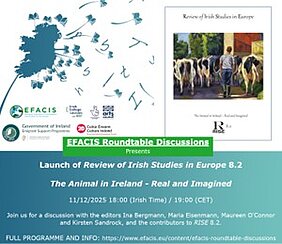EFACIS Roundtable Discussion: Launch of "Review of Irish Studies in Europe 8.2: The Animal in Ireland - Real and Imagined"
| Datum: | 11.12.2025, 19:00 - 20:00 Uhr |
| Kategorie: | Startseite |
| Ort: | online, via zoom |
| Veranstalter: | EFACIS Roundtable Discussions |
Join guest editors Ina Bergmann, Maria Eisenmann, Maureen O’Connor and Kirsten Sandrock, and the contributors to this themed issue for the launch of RISE 8.2: The Animal in Ireland - Real and Imagined. Register here!
Review of Irish Studies in Europe 8.2
The Animal in Ireland – Real and Imagined
Forthcoming on 27 November
This is the first of two issues dedicated to this topic (with Issue 2 (9.1) to be published in Spring/Summer 2026).
St Ciarán’s legendary cowhide provided the vellum for one of the oldest surviving manuscripts in Irish literature, The Book of the Dun Cow (c. 1100). This manuscript contains the earliest recorded version of The Cattle Raid of Cooley, the central epic of the heroic Ulster Cycle. From these early origins through the centuries—from nineteenth-century caricatures depicting the Irish as simian to John Connell’s 2018 best-selling memoir The Cow Book—Irish cultural identity has remained deeply associated with the figure of the nonhuman animal, both real and imagined.
In the British imperial imaginary, this association justified representing the Irish as less-than-human. The link between Ireland and nonhuman animals helped, together with other colonial discourses, to rationalise centuries of occupation and exploitation. This legacy continues to complicate contemporary efforts to reclaim and honour Ireland’s traditional regard for the nonhuman world, a reverence that reaches back to myth and folklore.
The essays collected in these two themed issues explore how animals appear across Irish cultural production—from mythology and folklore to poetry and prose from the nineteenth century to the present and to contemporary visual art and film. They range from readings of Irish-language accounts of mythological legends to considerations of contemporary art installations as well as pedagogical approaches for integrating animal studies into the EFL classroom. Attending to both Irish specificities and broader transnational contexts, the contributors examine the human/nonhuman divide through the lenses of colonial history, postcolonial identity and ecological responsibility.
The EFACIS Roundtable Discussions are a great tool for scholars to connect and share and discuss their research. They provide a platform for academic discussions on many different topics and bring together scholars from all over Europe. The EFACIS Roundtable Discussions are open to all EFACIS members who wish to introduce a new network or project. If you would like to organise an EFACIS Roundtable Discussion, please contact the EFACIS coordinator.



